Religulous
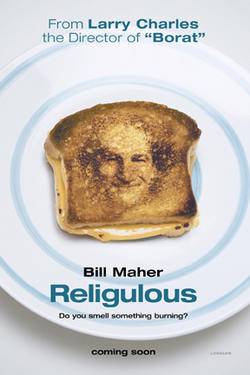
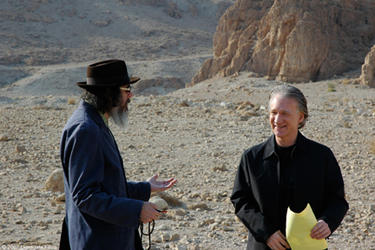 The title itself (a combination of the words "religion" and "ridiculous") pretty much explains Maher's personal view on the topic. He was born to a Jewish mother and a Catholic father, and was raised as a Catholic until he was 13. His family stopped going to church, and when Maher asks his mom why, she thinks it had something to do with the church's view on birth control. These days, Maher feels that religion is a dangerous thing. In an impassioned monologue that closes the film, he thinks that if Armageddon does come, it won't be because of a Second Coming, but because of religious Fundamentalists who won't do anything to try to stop the end of the world. He doesn't see how people can believe in the stories in religion if there is no documented or physical proof that cannot be challenged with another way of thinking. His targets in the film cover a wide range of religious views, although Christianity gets the most screen time. He also questions Judaism, Mormons, Scientology, and even a bizarre little religion that seems to be built around finding faith through smoking pot just to name a few. With a running time of only about 100 minutes, Maher obviously can't hit them all, and leaves out some religions. He has to save something for the sequel, you know.
The title itself (a combination of the words "religion" and "ridiculous") pretty much explains Maher's personal view on the topic. He was born to a Jewish mother and a Catholic father, and was raised as a Catholic until he was 13. His family stopped going to church, and when Maher asks his mom why, she thinks it had something to do with the church's view on birth control. These days, Maher feels that religion is a dangerous thing. In an impassioned monologue that closes the film, he thinks that if Armageddon does come, it won't be because of a Second Coming, but because of religious Fundamentalists who won't do anything to try to stop the end of the world. He doesn't see how people can believe in the stories in religion if there is no documented or physical proof that cannot be challenged with another way of thinking. His targets in the film cover a wide range of religious views, although Christianity gets the most screen time. He also questions Judaism, Mormons, Scientology, and even a bizarre little religion that seems to be built around finding faith through smoking pot just to name a few. With a running time of only about 100 minutes, Maher obviously can't hit them all, and leaves out some religions. He has to save something for the sequel, you know.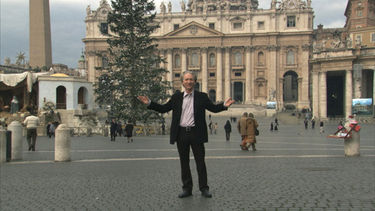 During the course of Religulous, Maher travels the world, visiting holy places in Rome and Egypt. He also visits some smaller places, such as when he visits a tiny makeshift chapel for truck drivers which is located inside a truck trailer early on. He then interviews both important people (a U.S. Senator who is very devout in his faith), and even some not-so important people (a guy who plays Jesus at a Christian amusement park in Orlando, Florida), and questions them in their faith. He asks a lot of good questions. How could a guy survive for three days in the belly of a whale (or big fish), as the story of Jonah wants us to believe? If God's going to come down and destroy the Devil, what's He waiting for? The answers he gets have obviously been edited to either fit Maher's views, or to entertain the audience. Director Larry Charles (Borat) edits and splices the interviews with funny archival film clips, or witty subtitles that either question what the interviewee is saying while Maher listens patiently, or points out the inconsistencies in what the person is saying to him.
During the course of Religulous, Maher travels the world, visiting holy places in Rome and Egypt. He also visits some smaller places, such as when he visits a tiny makeshift chapel for truck drivers which is located inside a truck trailer early on. He then interviews both important people (a U.S. Senator who is very devout in his faith), and even some not-so important people (a guy who plays Jesus at a Christian amusement park in Orlando, Florida), and questions them in their faith. He asks a lot of good questions. How could a guy survive for three days in the belly of a whale (or big fish), as the story of Jonah wants us to believe? If God's going to come down and destroy the Devil, what's He waiting for? The answers he gets have obviously been edited to either fit Maher's views, or to entertain the audience. Director Larry Charles (Borat) edits and splices the interviews with funny archival film clips, or witty subtitles that either question what the interviewee is saying while Maher listens patiently, or points out the inconsistencies in what the person is saying to him.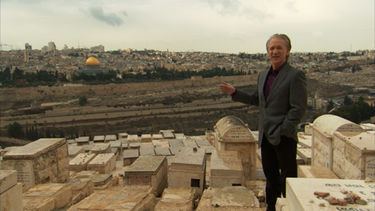 To me, Maher isn't really seeking answers to the questions he's asking, but simply wants to spark discussion and thought with his audience. The way he constantly interrupts and says sarcastic little zingers to the people he's supposed to be interviewing pretty much shows that these people could say anything to him, and he wouldn't believe them unless they somehow were able to call God down to talk to him. Half the time, I expected his subjects to get a lot angrier with him than they appear, but only once in the film does a person walk out on him. (He is thrown out of a couple places, though, before he can get too far in his interview.) A lot of the comments he makes are actually funny. When some Mormons tell him that they believe Missouri will be the location of Paradise, Maher quips that he hopes it's Branson. When someone tries to tell him that people are not born gay, Maher questions that notion by using Little Richard as evidence for his personal view. There are some people Maher talks to that actually share a lot of his own questions, such as a Roman Catholic priest who dismisses a lot of their personal teachings, such as the existence of Hell and the Devil himself. Here, Maher has very little to say, and mainly just lets the person talk.
To me, Maher isn't really seeking answers to the questions he's asking, but simply wants to spark discussion and thought with his audience. The way he constantly interrupts and says sarcastic little zingers to the people he's supposed to be interviewing pretty much shows that these people could say anything to him, and he wouldn't believe them unless they somehow were able to call God down to talk to him. Half the time, I expected his subjects to get a lot angrier with him than they appear, but only once in the film does a person walk out on him. (He is thrown out of a couple places, though, before he can get too far in his interview.) A lot of the comments he makes are actually funny. When some Mormons tell him that they believe Missouri will be the location of Paradise, Maher quips that he hopes it's Branson. When someone tries to tell him that people are not born gay, Maher questions that notion by using Little Richard as evidence for his personal view. There are some people Maher talks to that actually share a lot of his own questions, such as a Roman Catholic priest who dismisses a lot of their personal teachings, such as the existence of Hell and the Devil himself. Here, Maher has very little to say, and mainly just lets the person talk.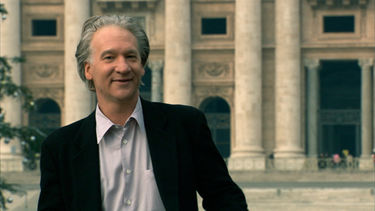 One of the more fascinating interviews to me is when Maher talks to a man who actually believes that he is the Second Coming, and is actually Jesus resurrected. He is Jose Luis de Jesus Miranda, and he has 100,000 followers. He explains how the holy bloodline of Jesus went from the Holy Land to France to Spain to Puerto Rico. Maher lets the guy know that while it's convenient he has Jesus in his name, his last name hints that he could also be the resurrection of Carmen Miranda. To say that this movie is preaching to its own choir would be an understatement. It's an entirely one-sided film, yes, and I would have liked some more deeper and probing interviewing on Maher's part. But, I cannot deny that I was engaged and very entertained throughout the film. Some of the people he's found in this movie are astonishing, such as a guy who has invented things to sidestep bans on Sabbath activity. His take on the telephone has to be seen to be believed.
One of the more fascinating interviews to me is when Maher talks to a man who actually believes that he is the Second Coming, and is actually Jesus resurrected. He is Jose Luis de Jesus Miranda, and he has 100,000 followers. He explains how the holy bloodline of Jesus went from the Holy Land to France to Spain to Puerto Rico. Maher lets the guy know that while it's convenient he has Jesus in his name, his last name hints that he could also be the resurrection of Carmen Miranda. To say that this movie is preaching to its own choir would be an understatement. It's an entirely one-sided film, yes, and I would have liked some more deeper and probing interviewing on Maher's part. But, I cannot deny that I was engaged and very entertained throughout the film. Some of the people he's found in this movie are astonishing, such as a guy who has invented things to sidestep bans on Sabbath activity. His take on the telephone has to be seen to be believed.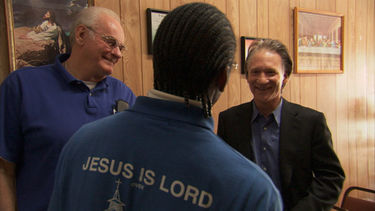
See the movie times in your area or buy the DVD at Amazon.com!






0 Comments:
Post a Comment
<< Home